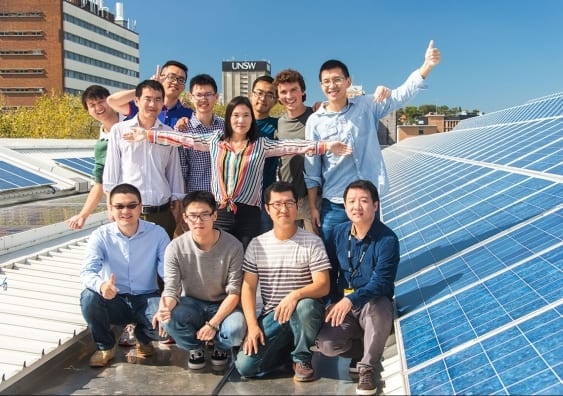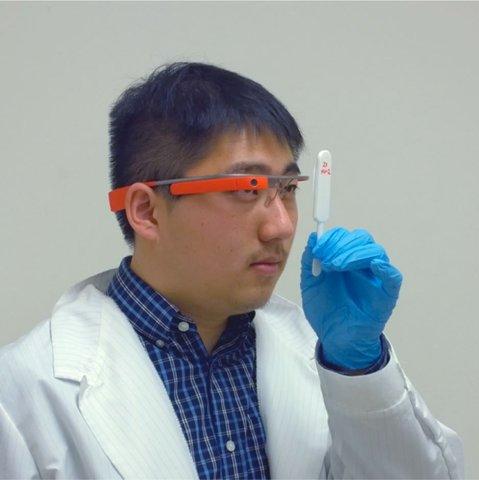
That they have the potential to produce cheaper electricity than coal-fired generators can
SUNLIGHT is free, but that is no reason to waste it. Yet even the best silicon solar cells—by far the most common sort—convert only a quarter of the light that falls on them. Silicon has the merit of being cheap: manufacturing improvements have brought its price to a point where it is snapping at the heels of fossil fuels. But many scientists would like to replace it with something fundamentally better.
John Rogers, of the University of Illinois, Urbana-Champaign, is one. The cells he has devised (and which are being made, packaged into panels and deployed in pilot projects by Semprius, a firm based in North Carolina) are indeed better. By themselves, he told this year’s meeting of the American Association for the Advancement of Science, they convert 42.5% of sunlight. Even when surrounded by the paraphernalia of a panel they manage 35%. Suitably tweaked, Dr Rogers reckons, their efficiency could rise to 50%. Their secret is that they are actually not one cell, but four, stacked one on top of another.
Solar cells are made of semiconductors, and every type of semiconductor has a property called a band gap that is different from that of other semiconductors. The band gap defines the longest wavelength of light a semiconductor can absorb (it is transparent to longer wavelengths). It also fixes the maximum amount of energy that can be captured from photons of shorter wavelength. The result is that long-wavelength photons are lost and short-wave ones incompletely utilised.
Dr Rogers gets round this by using a different material for each layer of the stack. He chooses his materials so that the bottom of the band gap of the top layer matches the top of the band gap of the one underneath, and so on down the stack. Each layer thus chops off part of the spectrum, converts it efficiently into electrical energy and passes the rest on.
The Latest on: Efficiency of solar cells
[google_news title=”” keyword=”Efficiency of solar cells” num_posts=”10″ blurb_length=”0″ show_thumb=”left”]
via Google News
The Latest on: Efficiency of solar cells
- Powering drones with ultra-thin, flexible perovskite PV cellson May 9, 2024 at 1:07 am
An Austrian research team has demonstrated lightweight, flexible and ultra-thin perovskite solar technology in palm-sized autonomous drones, showcasing the stability and energy-harvesting potential of ...
- New doping strategy increases lead-free perovskite solar cell efficiencyon May 9, 2024 at 12:00 am
An international research group has developed a solar cell based on a lead-free perovskite material known as Cs2AgBiBr6. The cell's absorber was doped with trans-polyacetylene, which reportedly helped ...
- Scientists make advancements with groundbreaking binary organic solar cell technology: 'Highly efficient and stable'on May 8, 2024 at 5:30 pm
The scientists are improving the technology while also making the cells easier to place. Scientists make advancements with groundbreaking binary organic solar cell technology: 'Highly efficient and ...
- Longi announces 27.30% efficiency for heterojunction back contact solar cellon May 8, 2024 at 4:44 pm
The Chinese module manufacturer said the new efficiency record was confirmed by Germany’s Institute for Solar Energy Research (ISFH).
- LONGi Sets New World-Record for Silicon Solar Cell Efficiency, Launching 2nd Generation Ultra-Efficient BC-Based Moduleon May 8, 2024 at 1:10 pm
featuring industry-leading silicon solar module conversion efficiency of up to 24.43% The announcement represents the 17 th time that the company has set a world-record in solar cell efficiency since ...
- LONGi unveils heterojunction back-contact cell with record 27.3% conversion efficiencyon May 8, 2024 at 8:28 am
LONGi has set a new record for power conversion efficiency for silicon heterojunction back-contact (HBC) cells, of 27.3%.
- A low-energy process for high-performance solar cells could simplify the manufacturing processon May 8, 2024 at 7:39 am
Finding reliable, eco-friendly power sources is crucial as our world grapples with increasing energy needs and the urgent call to combat climate change. Solar energy offers one solution, with ...
- Researchers identify cause of electron-hole separation in thin-film solar cells to increase solar cell efficiencyon May 8, 2024 at 6:38 am
A team of researchers have collaborated to characterize electron-hole separation in the light-absorbing layer of kesterite thin-film solar cells. This study is expected to improve the efficiency of ...
- LONGi reaches 27.3% efficiency on HJT solar cells in labon May 8, 2024 at 5:11 am
LONGi has broken another world-record for silicon solar cell efficiency. As certified by Germany's Institute for Solar Energy Research Hamelin (ISFH), new ...
- Researchers Boost the Efficacy of Solar Panelson May 7, 2024 at 5:00 pm
The researchers found that by integrating these reflectors into solar setups, they could improve the system’s energy production and efficiency ... found that placing reflective surfaces under solar ...
via Bing News










